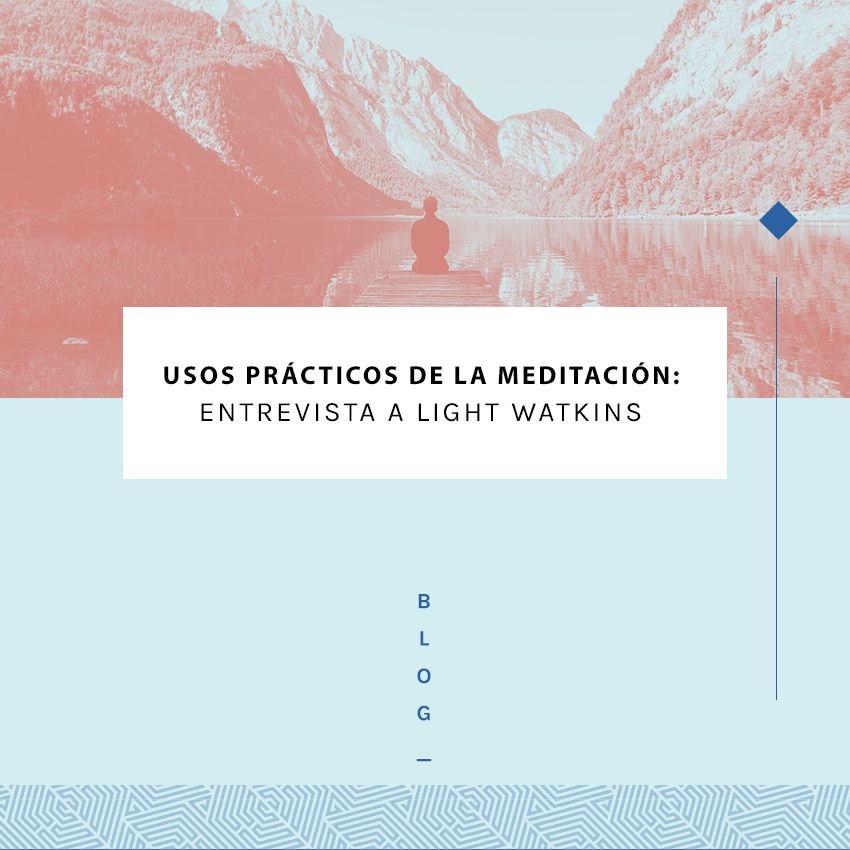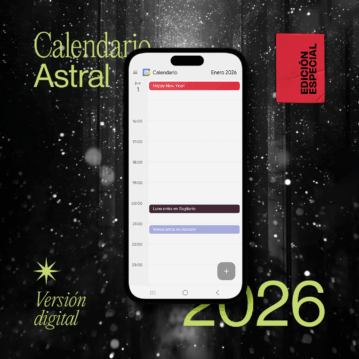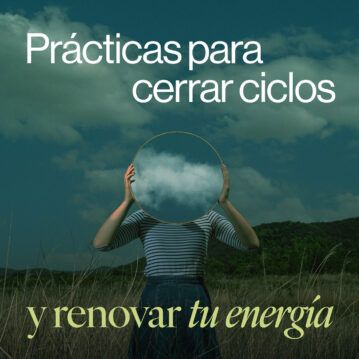
Descubre los usos prácticos de la meditación
¿Te gustó este contenido? Haz clic en me gusta y consulta de nuevo, cuando quieras, en la sección de Mis Favoritos
¿Es posible encontrarle un uso práctico a la meditación en tu día a día? Light Watkins, profesor, conferencista y autor del libro “Bliss more: how to succeed in meditation without really trying” (Disfruta más: como tener una meditación exitosa sin intentarlo), nos dice que sí desde su experiencia integrando la práctica de la meditación védica a su vida.
Si eres un fiel practicante de la meditación, o si apenas vas comenzando, aquí tienes el testimonio y la experiencia de quien ha experimentado sus beneficios y los ha hecho parte central de su rutina.
Al final de la entrevista podrás leer su versión original en inglés. Scroll down to read the english version.
P
En tu experiencia, ¿cómo ha cambiado tu vida con la meditación?
R
He visto que mi bienestar general ha mejorado. Mi perspectiva de la vida se ha transformado a medida que estoy más consciente de mi intuición. Mi trato hacia los otros ha mejorado a medida que disfruto de un mayor sentido de conexión entre mi ser y otros. Esto me hace mucho más empático y comprensivo, mucho menos crítico. Oh, y duermo mejor, me enfoco con facilidad y en general me siento más feliz.
P
Cuéntanos sobre el tipo de meditación que practicas (Meditación Védica)
R
Lo que hace única a la meditación védica es que no tienes que sentarte en una posición incómoda, no tienes que pelear con tu mente, y tienes un profesor en vivo que te enseña y te apoya en la clase. Aprendes a ser más amable contigo a través de la meditación, sin los pensamientos avergonzantes, que abundan en la comunidad de meditación.
P
¿Cuáles son los conceptos erróneos más comunes que la gente tiene sobre la meditación?
R
Que tienes que hacerla con una disciplina de monje para que sea exitosa y nunca te puedes quedar dormido. También que tienes que calmar tu “mente inquieta”. Nada de eso tiene sentido. La ciencia demuestra que sentarse cómodamente y estar en calma con tus pensamientos es efectivo (y hasta más efectivo) que intentar meditar como un monje. ¡Y es más divertido también!
P
¿Cómo podemos entregarnos al proceso de la meditación?
R
Entregándote en todo momento a la idea de cómo sientes que debería ir progresando tu meditación. Mantén la mente abierta y ríndete ante cualquier pensamiento, sensación, ruido o distracción que aparezca en el momento. Si te encuentras resistiéndote, vuelve a ser pasivo.
P
¿Podemos encontrar un uso “práctico” para la meditación en la vida diaria?
R
Nuestras vidas son ocupadas y a veces estresantes. Pausarnos a meditar puede darnos un muy bienvenido espacio para descargar el estrés, y permitirnos estar menos ansiosos y más presentes en nuestro trabajo y relaciones. Recomiendo meditar entre 10 y 20 minutos dos veces por día.
P
¿Es posible sanar a través de la meditación?
R
Sí, pero yo nunca he usado la meditación como única herramienta de sanación, más bien, puede ayudarnos a ponernos en sintonía con los problemas de base y trabajar en ellos directamente, en vez de solo tratar los síntomas.
P
¿Siempre necesitamos un maestro o guía para meditar?
R
No hay nada arbitrario en esta práctica, así que en el inicio es sumamente recomendable tener un profesor experto y calificado que te ayude a aprender los básicos de la meditación. Si no tienes acceso a un profesor, busca libros o videos creados por maestros que activamente enseñan a personas a meditar, no gurús de autoayuda, ni doctores, investigadores o monjes.
Evita los videos y libros escritos por personas que sólo meditan, pero nunca han enseñado a alguien a meditar, porque lo más probable es que sus instrucciones te resulten confusas y superficiales. Una vez que has aprendido a meditar te resultará fácil hacerlo por tu cuenta.
P
¿Cuál es el propósito de la meditación?
R
La meditación significa diferentes cosas para diferente personas. En mi experiencia, el propósito de la meditación es ir más allá de la superficie de la mente pensante y hacia un estado más calmo. Allí es cuando encuentras el tesoro, en la forma de descanso profundo, creatividad exaltada, mayor intuición, una mayor sensación de ti mismo y mucho más. Como efectos secundarios deseables, estarás más feliz, menos estresado y más presente en tu vida.
P
¿Cuál es un buen primer paso para alguien que nunca ha meditado o que lo ha hecho, pero “no le gustó”?¿Cuál es un buen primer paso para alguien que nunca ha meditado o que lo ha hecho, pero “no le gustó”?
R
Recomendaría un curso de introducción a la meditación con alguien que enseñe meditación Védica, o leer mi libro “Bliss More” y tomar el reto de 21 días que lo acompaña (blissmore.co).
P
¿Crees que cuando experimentamos felicidad -por ejemplo, al hacer algo que amamos- alcanzamos un estado meditativo? ¿Por qué?
R
Absolutamente, pero entrar en un estado meditativo no es lo mismo que tener una práctica de meditación. De la misma manera que puedes alcanzar la euforia al ver a tu equipo deportivo favorito marcar un punto a favor en el último minuto del partido, pero no obtienes ninguna recompensa y una vez que pasa ese pico de emoción, regresas a como estás siempre. Con una práctica de meditación diaria, hay un efecto de continuidad donde ese estado dura más y más, hasta que eventualmente está allí todo el tiempo.
English version
Q
In your experience, how has your life changed with meditation?
A
I’ve noticed that my overall wellbeing has improved. My perspective on life has shifted as I’ve become more aware of my intuition. My behavior towards others has improved as enjoy a greater sense of connection between myself and others. This makes me a lot more empathetic and understanding, and less judgemental. Oh, and I sleep better, focus easier, and I feel overall happier.
Q
Tell us more about the type of meditation you practice (Vedic Meditation)?
A
What makes Vedic Meditation unique is that you don’t have to sit in an uncomfortable position, you don’t have to fight your mind, and you have a real-life teacher to show you the ropes and support you in your practice. You learn how to be kinder to yourself in meditation, without the thought shaming, which is rampant in the meditation community.
Q
What are the most common misconceptions about meditation?
A
That you have to approach it with monk-like discipline in order to be successful. And you can never fall asleep. And you have to tame your so-called «monkey mind.» It’s all nonsenes. The science shows that sitting comfortably and being relaxed about your thoughts is as effective if not more effective as approaching meditation like a monk. And it’s a lot more fun too!
Q
How can we surrender to the process of meditation?
A
Be willing at all times to surrender your idea of how you feel your meditation should be progressing. Stay open minded and surrender to whatever thoughts, sensations, noises or distractions arise in the moment. If you find yourself resisting, go back to being passive.
Q
Can we find a practical «use» for meditation in our every day life?
A
Our lives are busy and often stressful. Pausing to meditate can give us a welcomed outlet for the incoming stress, and allow us to be less anxious and more present in our work and relationships. I recommend meditating for 10-20 minutes once or twice a day.
Q
Is it possible to heal through meditation?
A
Yes, but I never approach meditation as the sole healing modality. Rather, it can help us tune into the underlying issues and address them directly, instead of only treating the symptoms.
Q
Do we always need a master or a teacher to meditate?
A
There’s nothing arbitrary about the practice, so initially it’s highly recommended to have a qualified expert teacher to help you learn the ins and outs of meditation. If you don’t have access to a teacher, then search for books or videos created by expert teachers who actively teach people to meditate—not self-help gurus, doctors, researchers, or monks.
Avoid books and videos written by people who only meditate, but have never taught anyone to meditate, as you’ll most likely find their instructions superficial and confusing. And after you’ve properly learned how to meditate from a teacher, it can easily be done on your own.
Q
What is the purpose of meditation?
A
Meditation means different things to different people. In my experience, the purpose of meditation is to go beyond your surface thinking mind and into a more settled state. That’s where you’ll find the pot of gold in the form of deep rest, heightened creativity, increased intuition, a greater sense of Self, and much more. As a desirable side effect, you’ll become happier, less stressed, and more present in your life.
Q
What is a good start for someone who has never meditated or who has meditated but «didn’t like it»?
A
I would recommend an intro to meditation course with someone who teaches Vedic Meditation and/or read my book Bliss More and take the companion 21-day challenge (blissmore.co).
Q
Do you think that when we experience a lot of happiness – for example, by doing something we love – we reach a meditative state? Why?
A
Absolutely. But having a meditative state is not the same as having a meditation practice. In the same way, euphoria may be reached by watching your favorite sports team score the final point and win the game. But you don’t get any of the rewards from the win. And after your high wears off, you’ll be back to your old self. But with a daily meditation practice, there’s a carry-over effect where the high can last longer and longer, and eventually it’ll be there all the time.






